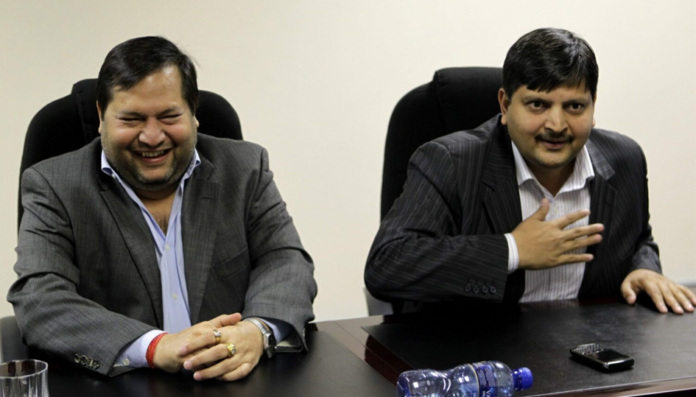The arrest of Ajay Gupta and Anil Gupta has generated significant attention, stemming from the tragic death of builder Satyendra Singh Sahni. The sequence of events began with Sahni’s suicide, which has been attributed to the immense pressure and alleged threats he faced from the Guptas.
Sahni, a prominent figure in the construction industry in Dehradun, was engaged in a partnership project with the Guptas, a relationship that appears to have deteriorated over financial disputes.
In his suicide note, Sahni explicitly named Ajay Gupta and Anil Gupta, accusing them of coercion and interference in his business operations. The note, which was addressed to Prime Minister Narendra Modi and Uttarakhand Chief Minister Pushkar Singh Dhami, detailed the threats and harassment Sahni purportedly endured.
[ Mkhwebane Fumes Over NPA Decision Not To Prosecute Fikile Mbalula Over Dubai Family Trip ]
The contents of the note have been pivotal in the police investigation, providing critical evidence that led to the Guptas’ arrest.
The financial matters at the heart of the dispute involved significant sums, with Sahni alleging that the Guptas had employed dubious tactics to exert undue pressure on him.
These tactics, Sahni claimed, included threats to his safety and his family’s well-being. The gravity of these allegations prompted law enforcement agencies to take swift action, culminating in the apprehension of the Guptas.
The police investigation has uncovered a series of communications and transactions supporting Sahni’s assertions of coercion. These findings have painted a troubling picture of manipulation and intimidation, reinforcing the narrative presented in Sahni’s final words.
Ajay Gupta and Anil Gupta were arrested under intense scrutiny in the Dalanwala area of Dehradun. On October 3, law enforcement officers arrived at the Gupta residence armed with a warrant.
The operation was conducted by a team led by Senior Superintendent of Police Ajay Singh, who coordinated the swift and precise apprehension of the two brothers. The arrest followed the tragic suicide of a local builder, which had sparked widespread public and media attention.
Senior Superintendent Singh addressed the media shortly after the arrest, providing significant insights into the investigation. “The evidence we have collected so far strongly indicates that the Gupta brothers were involved in illegal activities that exerted undue pressure on the deceased.
“Our primary focus is to ensure that justice is served, and we are committed to conducting a thorough and impartial investigation,” stated Singh.
The Gupta brothers are scheduled to appear in court later this week, where they will face a formal arraignment on charges of coercion and interference in business practices.
Legal experts anticipate that the court proceedings will be closely monitored, given the high-profile nature of the case and the implications it holds for business ethics and legal compliance in the region.
The Gupta family, originally hailing from India, rose to prominence in South Africa through a complex web of business and political connections. Their close ties with former South African President Jacob Zuma were instrumental in their ascent, but these connections also led to significant legal troubles.
The term “state capture” became synonymous with the Guptas, describing their alleged influence over government institutions, appointments, and financial decisions for personal gain.
In 2018, as the net of investigations tightened around them, the Guptas fled to the United Arab Emirates. Their departure triggered a cascade of legal actions, including the issuance of Interpol red notices for their arrest.
Rajesh and Atul Gupta were subsequently apprehended in Dubai in connection with a separate case of fraud and money laundering. This arrest marked a significant milestone for South African authorities, who had been grappling with the complexities of international extradition laws.
Despite these arrests, the path to extradition has proven arduous, with legal and diplomatic hurdles impeding swift justice.
The South African government has faced numerous challenges in their attempts to bring the Guptas to trial. Extradition treaties, differences in legal systems, and procedural delays have all contributed to the slow progress.
Catch up with the latest news from The Times Post on WhatsApp by following our channel. Click here to join.
Kindly follow @thetimespost on Instagram. On X (Twitter), follow @thetimespost2.















